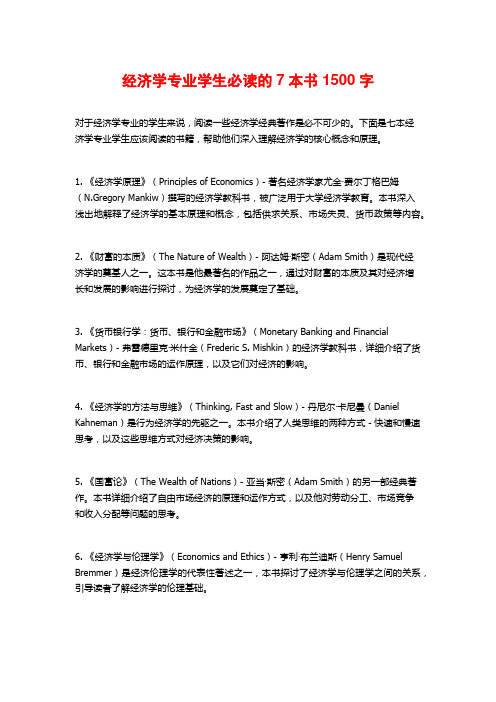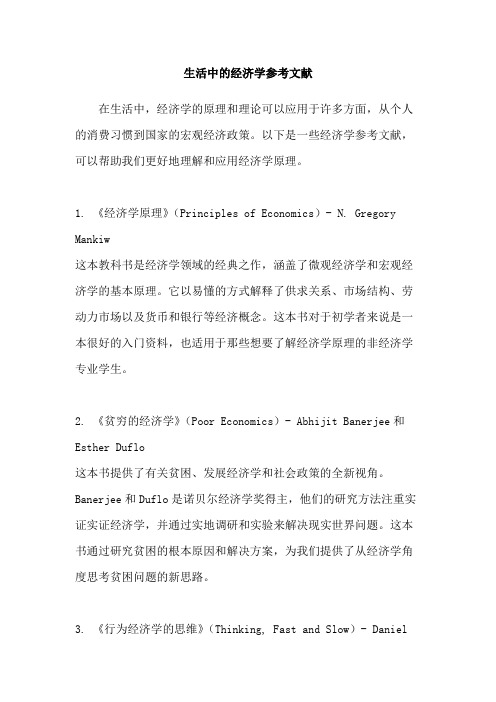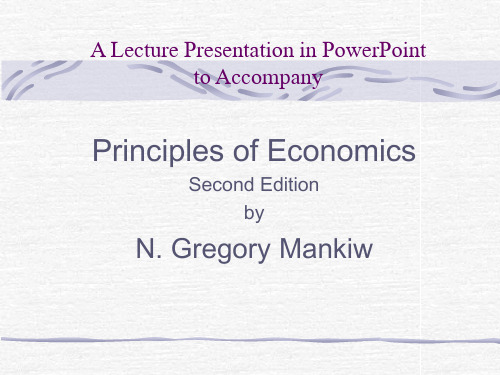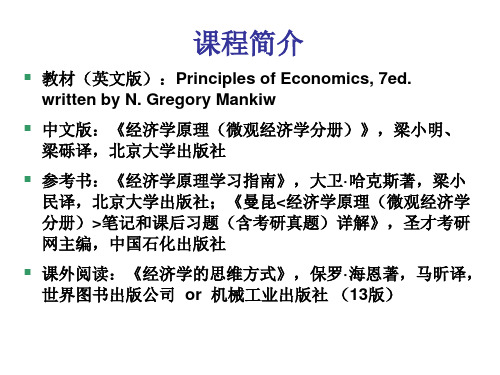Theprinciplesofeconomics.经济学的原理(英译中)
经济学专业学生必读的7本书

经济学专业学生必读的7本书1500字对于经济学专业的学生来说,阅读一些经济学经典著作是必不可少的。
下面是七本经济学专业学生应该阅读的书籍,帮助他们深入理解经济学的核心概念和原理。
1. 《经济学原理》(Principles of Economics)- 著名经济学家尤金·费尔丁格巴姆(N.Gregory Mankiw)撰写的经济学教科书,被广泛用于大学经济学教育。
本书深入浅出地解释了经济学的基本原理和概念,包括供求关系、市场失灵、货币政策等内容。
2. 《财富的本质》(The Nature of Wealth)- 阿达姆·斯密(Adam Smith)是现代经济学的奠基人之一。
这本书是他最著名的作品之一,通过对财富的本质及其对经济增长和发展的影响进行探讨,为经济学的发展奠定了基础。
3. 《货币银行学:货币、银行和金融市场》(Monetary Banking and Financial Markets)- 弗雷德里克·米什金(Frederic S. Mishkin)的经济学教科书,详细介绍了货币、银行和金融市场的运作原理,以及它们对经济的影响。
4. 《经济学的方法与思维》(Thinking, Fast and Slow)- 丹尼尔·卡尼曼(Daniel Kahneman)是行为经济学的先驱之一。
本书介绍了人类思维的两种方式 - 快速和慢速思考,以及这些思维方式对经济决策的影响。
5. 《国富论》(The Wealth of Nations)- 亚当·斯密(Adam Smith)的另一部经典著作。
本书详细介绍了自由市场经济的原理和运作方式,以及他对劳动分工、市场竞争和收入分配等问题的思考。
6. 《经济学与伦理学》(Economics and Ethics)- 亨利·布兰迪斯(Henry Samuel Bremmer)是经济伦理学的代表性著述之一,本书探讨了经济学与伦理学之间的关系,引导读者了解经济学的伦理基础。
生活中的经济学参考文献

生活中的经济学参考文献在生活中,经济学的原理和理论可以应用于许多方面,从个人的消费习惯到国家的宏观经济政策。
以下是一些经济学参考文献,可以帮助我们更好地理解和应用经济学原理。
1. 《经济学原理》(Principles of Economics)- N. Gregory Mankiw这本教科书是经济学领域的经典之作,涵盖了微观经济学和宏观经济学的基本原理。
它以易懂的方式解释了供求关系、市场结构、劳动力市场以及货币和银行等经济概念。
这本书对于初学者来说是一本很好的入门资料,也适用于那些想要了解经济学原理的非经济学专业学生。
2. 《贫穷的经济学》(Poor Economics)- Abhijit Banerjee和Esther Duflo这本书提供了有关贫困、发展经济学和社会政策的全新视角。
Banerjee和Duflo是诺贝尔经济学奖得主,他们的研究方法注重实证实证经济学,并通过实地调研和实验来解决现实世界问题。
这本书通过研究贫困的根本原因和解决方案,为我们提供了从经济学角度思考贫困问题的新思路。
3. 《行为经济学的思维》(Thinking, Fast and Slow)- DanielKahneman这本书由诺贝尔奖得主Daniel Kahneman撰写,他是行为经济学的奠基人之一。
这本书探讨了人类思维的两个系统:快速直觉和慢速理性。
Kahneman通过揭示人类决策和行为中的认知偏差,帮助我们更好地理解经济决策背后的心理和行为模式。
这对于个人和商业决策者来说是一个宝贵的参考,可以帮助我们避免常见的思维陷阱。
4. 《资本论》(Capital)- Karl Marx虽然这本书是在19世纪写的,但它仍然是经济学和社会学领域的重要参考文献。
《资本论》详细研究了资本主义制度、剥削和阶级斗争等问题。
尽管马克思的观点在现代经济学中有争议,但他的思想对于理解经济体系的基本结构和潜在问题仍然具有重要意义。
5. 《经济学家的秘密》(The Secrets of the Economist)- William Poundstone这本书探讨了经济学家在日常生活中如何运用经济学原理做出决策。
曼昆英文版《经济学原理》01-经济学十大原理

Marginal changes are small, incremental adjustments to an existing plan of action.
People make decisions by comparing costs and benefits at the margin.
Guns v. butter Food v. clothing Leisure time v. work Efficiency v. equity Making decisions requires trading off one goal against another.
1. People face tradeoffs. Efficiency v. Equity
1. People face tradeoffs.
"There is no such thing as a free lunch! lunch!"
1. People face tradeoffs.
To get one thing, we usually have to give up another thing.
7. Governments can sometimes improve market outcomes.
Market failure may also be caused by market power, which is the ability of a single person or firm to unduly influence market prices.
经济学原理英文版

经济学原理英文版Economics is the study of how individuals, businesses, and governments allocate resources to satisfy their needs and wants. It is a social science that examines how people make choices under conditions of scarcity and the consequences of those choices for society. The principles of economics provide a framework for understanding the behavior of individuals, businesses, and governments in the marketplace.One of the fundamental principles of economics is the concept of opportunity cost. Opportunity cost is the value of the next best alternative that is foregone when a choice is made. For example, if a student decides to spend an hour studying for an exam rather than going to the movies, the opportunity cost of studying is the enjoyment and entertainment that could have been gained from watching the movie. Understanding opportunity cost is important because it helps individuals and businesses make more informed decisions about how to allocate their resources.Another important principle of economics is the law of supply and demand. This principle states that the price of a good or service is determined by the relationship between the quantity supplied and the quantity demanded. When the supply of a good or service increases, and the demand for it remains constant, the price will decrease. Conversely, when the demand for a good or service increases, and the supply remains constant, the price will increase. Understanding the law of supply and demand is essential for businesses to set prices and for consumers to make purchasing decisions.In addition to opportunity cost and the law of supply and demand, economics also explores the concepts of production, consumption, and distribution. Production refers to the process of creating goods and services, while consumption refers to the use of those goods and services. Distribution involves the allocation of goods and services to individuals and businesses. These concepts are essential for understanding how resources are used and how wealth is created and distributed in society.Economics also examines the role of government in the economy. Governments play a critical role in regulating markets, providing public goods and services, andredistributing income. The study of economics helps us understand how government policies, such as taxes and subsidies, impact the behavior of individuals and businesses, as well as the overall performance of the economy.In conclusion, the principles of economics provide a framework for understanding how individuals, businesses, and governments make choices about how to allocate resources. By studying economics, we can gain insights into how markets work, how wealth is created and distributed, and how government policies impact the economy. Whether you are a student, a business owner, or a policymaker, a solid understanding of economics is essential for making informed decisions in today's complex and interconnected world.。
【经济学(双语)】【PrinciplesofEconomics】

LO36 项目管理能力。熟悉项目范围、项目时间、项目成本、项目质量、项目人员、 项目沟通、项目风险、项目采购、项目集成管理等。
指标点
LO361 熟悉项目范围、项目时间、项目成本、项目质量、项目人员 LO362 掌握项目策划、项目风险、项目采购 LO363 掌握项目集成管理
LO37 商务策划能力。能用已有的思维成果和创新的方法进行策划。熟悉营销策划原
编号 能力
毕业要求和指标点
LO11 理解他人的观点,尊重他人的观点,能在不同场合用书面或口头形式进行有效
沟通。
表达
LO1
沟通
LO111 倾听他人意见、尊重他人观点、分析他人需求。
指标点
LO112 应用书面或口头形式,阐释自己的观点,有效沟通。
LO21 学生能根据环境需要确定自己的学习目标,并主动地通过搜集信息、分析信
●
尽责 LO4
L0412 诚实守信:为人诚实,信守承诺,尽职尽责。
●
抗压
LO413 爱岗敬业:了解与专业相关的法律法规,充分认识本专业就业岗位
指标点
在社会经济中的作用和地位,在学习和社会实践中遵守职业规范,具备职
业道德操守。
LO414 身心健康,能承受学习和生活中的压力。
LO51 同群体保持良好的合作关系,做集体中的积极成员;善于从创新思维,利用自 己的知识与实践来提出新设想。
1.3.10 Society Faces a Short-run Tradeoff Between Inflation and Unemployment 能力要求:
知道: What is Economy 理解: What is Economics 分析: Market-based / Command-based economy 综合: Ten Principles of Economics 教学重点: Ten Principles of Economics Definition of economy and economics
曼昆英文版《经济学原理》01-经济学十大原理

2. The cost of something is what you give up to get it.
Decisions require comparing costs and benefits of alternatives.
Whether to go to college or to work? Whether to study or go out on a date? Whether to go to class or sleep in?
Society and Scarce Resources: The management of society’s resources is important because resources are scarce.
Scarcity . . .
. . . means that society has limited resources and therefore cannot produce all the goods and services people wish to have.
Economics
Economics is the study of how society manages its scarce resources.
Economists study. . .
How people make decisions. How people interact with each other. The forces and trends that affect the economy as a whole.
Marginal changes are small, incremental adjustments to an existing plan of action.
曼昆微观经济学经济学十大原理 英文版

1
CHAPTER
1
Ten Principles of Economics (经济学十大原理)
Economics
PRINCIPLES OF
N. Gregory Mankiw
© 2015 CUFE
In this chapter, look for the answers to these questions:
边际是高等数学微分的概念;理性人决策:边际收益>边际成
本(Do);边际收益<边际成本(Undo)
13
HOW PEOPLE MAKE DECISIONS
Principle #3: 理性人考虑边际量
Rational People Think at the Margin Exampconsiders whether to go to
HOW PEOPLE MAKE DECISIONS
Principle #2: 某种东西的成本是为了得到它而放弃的东西
The Cost of Something Is What You Give Up to Get It
Making decisions requires comparing the costs and
7
Society faces an important tradeoff:
HOW PEOPLE MAKE DECISIONS Principle #1: 人们面临权衡取舍
效率 (efficiency) vs. 平等 (equality)
Efficiency: 社会能从稀缺资源获得最大利益的特性 . when
college for an additional year, he compares the fees & foregone wages to the extra income he could earn with the extra year of education.
Chap_01导言(经济学原理,曼昆,中英文双语)

1. People face tradeoffs. 人们面临权衡取舍
“There is no such thing as a free lunch!” 天下没有免费的午餐
经济学——研究社会如何管理自己的稀
缺资源的学科。
Harcourt, Inc. items and derived items copyright © 2001 by Harcourt, Inc.
Economists study. . . 经济学家研究…
How
people make decisions.
LA Laker basketball star Kobe Bryant chose to skip college and go straight from high school to the pros where he has earned millions of dollars.
1. People face tradeoffs. Efficiency v. Equity
Efficiency
means society gets the most that it can from its scarce resources. Equity means the benefits of those resources are distributed fairly among the members of society.
Harcourt, Inc. items and derived items copyright © 2001 by Harcourt, Inc.
- 1、下载文档前请自行甄别文档内容的完整性,平台不提供额外的编辑、内容补充、找答案等附加服务。
- 2、"仅部分预览"的文档,不可在线预览部分如存在完整性等问题,可反馈申请退款(可完整预览的文档不适用该条件!)。
- 3、如文档侵犯您的权益,请联系客服反馈,我们会尽快为您处理(人工客服工作时间:9:00-18:30)。
Theprinciplesofeconomics.经济学的原理(英译中)The word economy es from the Greek word for “one who manages a household.” at first, this origin might seem peculiar.经济这个字眼来自希腊语中“家庭的管理者”,一开始,这个起源似乎看上去有些特殊。
But, in fact, households and economies have much in mon.但是,实际上,家庭和经济有许多的共同之处。
A household faces many decisions.一个家庭面临很多的决定。
It must decide which members of the household do which tasks and what each member gets in return:它必须要决定家庭成员要完成任务,并且将每个家庭中的成员都安排在内。
Who cooks dinner?谁烧正餐?Who does the laundry?谁做洗衣服?Who gets the extra dessert at dinner?谁可以得到额外的餐后甜点?Who gets to choose what TV show to watch?谁可以选择电视节目来看?In short, the household must allocate its scarce resources among its various members, taking into account each member’s abilitie s, efforts, and desires.总之,家庭必须把其缺乏的资源分配给其中的各种成员,并把每个成员能力,努力和愿望考虑进去,--Like a household, a society faces many decisions.和家庭一样,社会也面临很多的决定。
A society must decide what jobs will be done and who will do them.社会必须决定工作将要被完成,由谁来完成它们。
It needs some people to grow food, other people to make clothing, and still others to design puter software.它需要一些人来种植粮食,一些人来制作服装,还需要一些人来设计电脑软件。
Once society has allocated people (as well as land, buildings, and machines) to various jobs, it must decide who will eat caviar and who will eat potatoes.一旦社会分派人们(比如陆地,建筑物和机器)做各种不同的工作,它肯定决定谁将吃鱼子酱,谁将吃马铃薯。
It must decide who will drive a Porsche and who will take the bus.它肯定决定谁将开保时捷,谁将乘公共汽车。
The management of society’s resources is important because resources are scarce.因为资源缺乏所以社会资源的管理是非常重要的。
Scarcity means that society has less to offer than people wish to have. 不足意味着社会的供应不能满足人们的期望值。
Just as a household cannot give every member everything he or she wants, a society cannot give every individual the highest standard of living to which he or she might aspire.就像家庭不能满足所有成员的需求一样,社会不能给所有个体以他们所期待的最高的生活标准。
Economics is the study of how society manages its scarce resources. 经济学就是研究社会如何管理其缺乏的资源的方法。
--In most societies, resources are allocated not by a single central planner but through the bined actions of millions of households and firms.在大部分的社会中,资源并不是被单一的中心计划者分配而是由数百万家庭与相结合的行动分配。
Economists therefore study how people make decisions:因此经济学家研究人们如何做决定:How much they work, what they buy, how much they save, and how they invest their savings.他们做多少工作,他们买什么,他们节省多少,并且他们怎样用存款进行投资。
Economists also study how people interact with one another.经济学家也研究人们之间的相互影响。
For instance, they examine how the multitude of buyers and sellers of a good together determine the price at which the good is sold and the quantity that is sold and the economy as a whole, including the growth in average ine, the fraction of the population that cannot find work, and the rate at which prices are rising.例如,他们调查一件商品的顾客群和卖主是如何一起来制定出这件被售商品的价格,数量和整体的经济情况,包括平均收入的增长,小部分人口的失业,和价格上涨的速率。
Although the study of economics has many facets, the field is unified by several central ideas.尽管经济学的研究存在很多的侧面,但这一领域被几个中心的想法所统一。
In the rest of this chapter, we look at Ten Principles of Economics. 在这章的余下的部分中,我们看一下经济学的10个原则。
These principles recur throughout this book and are introduced here to give you an overview of what economics is all about.这些原则重复贯穿于这本书中,向你们介绍对经济学的一个总体的看法。
--How people make decisions.人们该怎样做决定。
There is no mystery to what an “economy” is.“经济”是什么,并不神秘。
Whether we are talking about the economy of Los Angeles, of the united state, or of the whole world, an economy is just a group of people interacting with one another as they go about their lives.无论我们谈论美国洛杉矶的经济,还是全球世界经济,经济都是一群人们与其他人的相互作用影响,就好像他们着手的人生一样。
-Because the behavior of an economy reflects the behavior of the individuals who make up the economy, we start our study of economics with four principles of individual decision-making.因为经济的行为反映组成经济的个体的行为,我们以个体做决定的4原则来开始经济学的研究。
Principle 1 people face tradeoffs.原则1,人们面对交易。
The first lesson about making decisions is summarized in the adage: 关于下决定的第一个功课被概括在格言中:“There is no such thing as a free lunch.”“没有免费的午餐”。
To get one thing that we like, we usually have to give up another thing that we like.为了得到我们所喜欢的一件东西,我们通常不得不放弃另一件我们所喜欢的东西。
Making decisions requires trading off one goal against another.做决定需要用一个目标取代其它所有的目标。
Consider a student who must decide how to allocate her most valuable resource her time.考虑一个学生必须决定如何来分配她的最有价值的资源和她的时间。
--She can spend all of her time studying economics;她可以花费她全部的时间来学习经济学。
She can spend all her time studying psychology;她可以花费她全部的时间来学习心理学。
or she can divide her time between the two fields.或者,她可以将她的时间分配给这两门学科。
For every hour she studies one subject, she gives up an hour she could have used studying the other.每个小时她学习一门学科,放弃一个小时她可能已经用它来学习其它的事情。
